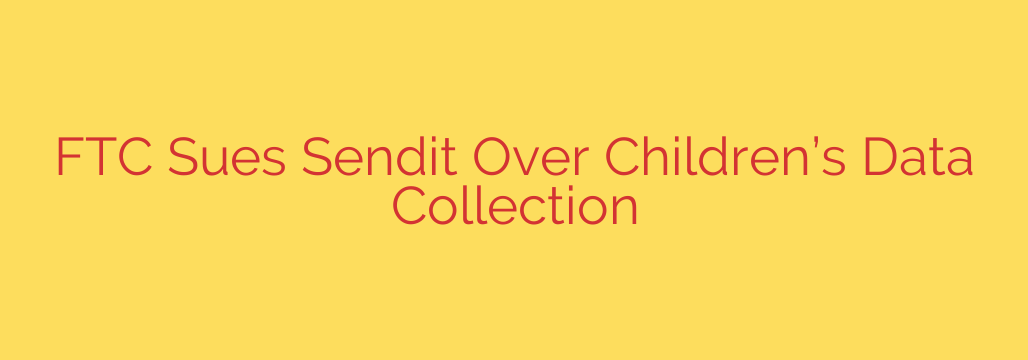
FTC Sues Sendit App: What Parents Need to Know About Children’s Data and Deceptive Practices
The Federal Trade Commission (FTC) has taken legal action against the popular social media app Sendit, which integrates with Snapchat, over serious allegations of illegally collecting children’s data and employing deceptive tactics to engage its young user base. This lawsuit highlights a growing concern for parents and serves as a stark reminder of the hidden risks in the apps our children use every day.
Sendit, known for its anonymous Q&A features and social games, is accused of violating the Children’s Online Privacy Protection Act (COPPA). This federal law strictly prohibits online services from collecting personal information from children under the age of 13 without verifiable parental consent. The FTC’s complaint alleges that Sendit did exactly that, creating a significant privacy risk for its youngest users.
The Core Allegations: Illegal Data Collection
According to the FTC, Sendit failed to establish proper age verification systems and knowingly collected sensitive data from users it knew were under 13. While the app’s privacy policy claimed it was not intended for this age group, its practices suggested otherwise.
The personal information allegedly collected without parental permission includes:
- Full names and usernames
- Dates of birth
- Contact information from the user’s device
- Precise geolocation data
This type of data collection is a direct violation of COPPA, which was specifically designed to give parents control over what information is gathered from their young children online. The lawsuit asserts that Sendit prioritized growth over legal compliance, creating an environment where children’s privacy was compromised.
Beyond Data: Allegations of Deceptive “Diamond Messages”
The FTC’s complaint goes beyond just data collection, accusing Sendit of actively deceiving its users, including minors. The lawsuit calls out a specific premium feature known as “Diamond Messages.”
This feature promised users the ability to receive a hint about the identity of someone who had sent them an anonymous message—for a weekly subscription fee of $9.99. However, the FTC alleges that many of these tantalizing messages were not from friends or secret admirers at all. Instead, they were computer-generated, fake messages sent by Sendit itself to entice users into paying for the premium service. This practice is a classic bait-and-switch, preying on social curiosity to drive revenue.
A Pattern of Disregard: Ignoring Obvious Underage Use
The commission argues that Sendit should have been well aware of its young audience. The app’s primary integration with Snapchat—a platform immensely popular with teens and pre-teens—was a clear indicator. Furthermore, the complaint points out a glaring contradiction: while Sendit’s policy stated it was for users 13 and older, it had an age rating of “12+” on the Apple App Store, sending mixed signals and failing to implement a robust age-gate to screen out younger users.
This lawsuit is part of a broader crackdown by the FTC on companies that fail to protect children’s privacy. The potential consequences for Sendit are severe, including significant financial penalties and a court order to delete all illegally collected data and cease its unlawful practices.
How Parents Can Protect Their Children Online
This case serves as a critical wake-up call. While regulators take action, parents are on the front lines of protecting their kids in the digital world. Here are some actionable steps you can take:
- Talk Openly About Apps: Have regular conversations with your children about the apps they are using. Ask them to show you how they work and who they interact with on them.
- Be Wary of “Anonymous” Features: Apps that offer anonymity can be breeding grounds for cyberbullying and deceptive practices. Explain the risks of anonymous communication to your children.
- Review Privacy Settings: Sit down with your child and review the privacy and data settings on their favorite apps and devices. Disable location tracking and limit data sharing wherever possible.
- Monitor In-App Purchases: Keep a close eye on your credit card and app store accounts. Unexpected charges, like a recurring $9.99 fee, could be a sign of a deceptive feature designed to lure in young users.
- Educate on Data Privacy: Teach your children that their personal information—like their full name, school, or location—is valuable and should not be shared freely online.
The FTC’s lawsuit against Sendit is a powerful reminder that not all apps are what they seem. For developers, it’s a clear warning: protecting children’s privacy is not optional. For parents, it’s a call to remain vigilant and engaged in our children’s digital lives.
Source: https://www.bleepingcomputer.com/news/legal/sendit-sued-by-the-ftc-for-illegal-collection-of-children-data/








